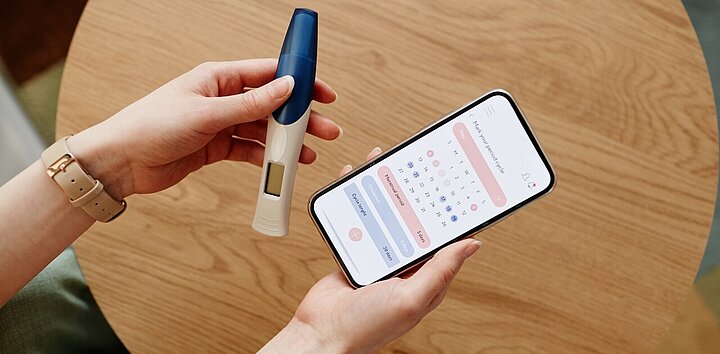Does Late Ovulation Impact Fertility?
Conception | | Kate Davies
If you think that you might be ovulating late in a cycle, you may be wondering if this will impact on your ability to conceive? In this article, we’ll explain what is meant by late ovulation, the reasons why you may be ovulating late in a cycle, how getting empowered helps you to find out when you ovulate, and what it means for you and your fertility.
Before we get into the ins and outs of ovulation, let’s dive in to understanding a bit about the menstrual cycle.
Menstrual cycle
The menstrual cycle is a natural, recurring process that prepares the female body for pregnancy. It typically lasts about 28 days, though it can range from 25 to 35 days. The cycle is controlled by a complex interplay of hormones and involves several key phases:
Menstrual Phase
This phase marks the start of the cycle. If the egg from the previous cycle wasn't fertilised, the lining of the uterus (endometrium) sheds, leading to menstrual bleeding. The hormones estrogen and progesterone drop, which triggers the shedding of the uterine lining.
Follicular Phase
This phase overlaps with the menstrual phase. The body begins to prepare for ovulation. The length of the follicular phase is variable and in women who have long cycles, this phase can be lengthy. The pituitary gland in the brain releases follicle-stimulating hormone (FSH), which stimulates the ovaries to produce several follicles. Each follicle contains an immature egg, but typically only one follicle will mature fully.
As FSH increases, causing the follicles to grow, estrogen levels also rise as the dominant follicle matures, thickening the uterine lining in preparation for a possible pregnancy.
Ovulatory phase
Ovulation is the release of a mature egg from the ovary. The surge in luteinizing hormone (LH), triggered by high estrogen levels, causes the follicle to rupture and release the egg. The egg then travels down the fallopian tube, where it can be fertilised.
Luteal Phase
After ovulation, the ruptured follicle transforms into the corpus luteum, which secretes progesterone. Progesterone helps maintain the thickened uterine lining, creating a supportive environment for a fertilised egg. This phase of the cycle generally last for 10-16 days. If the egg is not fertilised, the corpus luteum breaks down, causing progesterone levels to drop. The next bleed occurs, and the menstrual cycle starts again.
What is late ovulation?
Late ovulation is when the release of an egg occurs later in a woman's menstrual cycle than the usual mid-cycle timing. Typically, ovulation happens around day 14 of a 28-day cycle, but with late ovulation, it may not occur until after day 21 or later.
What are the causes of late ovulation?
There are several reasons why late ovulation may occur. In severe cases you may be told by your doctor that you are only ovulating a few times per year or not at all.
- Stress: Emotional or physical stress can disrupt the hormonal balance, delaying ovulation.
- Hormonal Imbalance: Conditions such as polycystic ovary syndrome (PCOS), disorders of the thyroid or increased prolactin levels may impact on the regulatory of ovulation.
- Premature Ovarian Insufficiency (POI): POI occurs when the ovaries stop functioning normally before the age of 40. Women with POI may experience irregular or absent ovulation, significantly affecting fertility.
- Lifestyle Factors: Significant weight gain or loss, excessive exercise, or a poor diet can impact ovulation.
- Medications: Certain medications, especially those affecting hormones, might delay ovulation. However, this is generally short term.
- Age: It’s common for young women, when they first start their periods, to have irregular cycles, some of which can be lengthy. These often settle down after a few months and fall into a regular pattern. As women age, cycles may become more irregular, especially during the perimenopause, potentially leading to late ovulation.
How do you know if you ovulate late?
The first indication that you might be ovulating later in a cycle is if you notice that your menstrual cycles are becoming longer in length. A longer cycle means that the first stage of the menstrual cycle, the follicular phase, has increased beyond the typical 14 ish days.
If you’re noticing that your cycles are consistently longer in length, you may want to find out a bit more about your menstrual cycle to help you predict when your period is due and, if you’re trying to conceive, when you ovulate. You can do this in various ways:
- Ovulation Predictor Kits (OPKs): Use an ovulation predictor kit, which measures the surge in luteinizing hormone (LH) that occurs before ovulation. If you consistently get a positive result later in your cycle, it could indicate late ovulation. However, it is important to note that OPK’s are not accurate for women with PCOS and therefore you may like to try observing and charting your natural fertility indicators.
- Basal Body Temperature (BBT) Charting: Track your basal body temperature daily. After ovulation, there's a noticeable increase in temperature. If this rise happens later than expected (e.g., after day 21 in a 28-day cycle), it suggests late ovulation.
- Cervical Mucus Monitoring: Monitor changes in your cervical mucus. Just before ovulation, it becomes clear, stretchy, and egg-white in consistency. If you notice these changes later in your cycle, it may indicate late ovulation.
If you do notice late ovulation and are worried that you may have an ovulatory or thyroid disorder or are trying to conceive, don’t delay in discussing your concerns with your doctor. Your doctor may suggest blood tests and an ultrasound scan to help understand why you are ovulating later and discuss your treatment options.
How does late ovulation impact on your fertility potential?
When you are trying to conceive, you might be wondering if you can ovulate late and still conceive? The short answer is – yes, however it may take you a little longer. If ovulation is delayed, it can be challenging to predict the most fertile days, making conception harder. Knowing when you ovulate is key in reducing how long it can take you to get pregnant.
In some circumstances, late ovulation may also lead to a shorter luteal phase (the time between ovulation and menstruation), which might affect the implantation of a fertilised egg.
Ovulating late in a cycle doesn’t necessarily mean that you won’t be able to conceive, it just may take a little longer and you may need some help from your doctor. If you are diagnosed with an ovulatory disorder such as PCOS, your doctor will talk to you about how you can manage your condition to optimise your fertility. If you are under the age of 35 and have been trying to conceive for 1 year, or you are over 35 and have been trying for 6 months, your doctor will suggest a referral to the fertility doctors to discuss the treatments available to you.
Is late ovulation normal?
It is normal for women to have cycles longer or shorter than a typical 28-day cycle. A longer cycle usually means that you are ovulating later in your menstrual cycle, and this is not uncommon.
Becoming empowered with your menstrual cycle and observing your natural fertility indicators can help you to understand your body better and know when you’re ovulating to help you conceive.
If you are concerned about your menstrual cycle and ovulation, or have been trying to conceive without success, don’t hesitate to speak with your doctor for advice and support.
FAQs about late ovulation
How late can you ovulate?
- Typically, ovulation happens around day 14 of a 28-day cycle, but with late ovulation, it may not occur until after day 21 or later. The follicular phase of the menstrual cycle is variable and is lengthy in long cycles. In general, ovulation occurs between 10-16 days before your period and therefore this phase, the luteal phase, is always consistent in length.
Is a 25-day cycle too short to conceive?
- Not at all, some women even ovulate during their period! A 25-day cycle is considered normal and doesn’t impact on your ability to conceive.
How does late ovulation affect a pregnancy test?
- Late ovulation has no affect. If you have conceived, even with late ovulation, you will still get a positive pregnancy test.
How does late ovulation affect due date?
- It is a bit of a myth that women always ovulate on day 14 of a cycle. If you ovulate later and conceive then this will mean that your due date will differ by a few days or even weeks!
Does late ovulation mean bad egg?
- There is no evidence to suggest that a late ovulation impacts on the health of your eggs or fertilised embryo.
I didn’t ovulate this month, could I still be pregnant?
- If you are sure that you didn’t ovulate this cycle and therefore had a cycle without ovulation occurring, then you will not have conceived this month. Be reassured that, if in general, you have regular cycles, then this means you are most likely ovulating each cycle.


